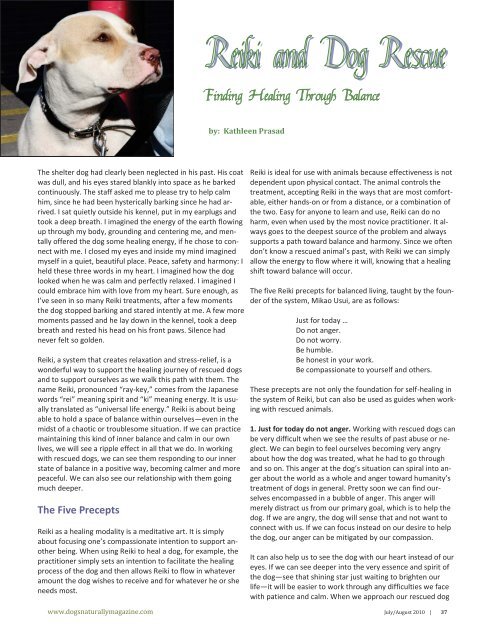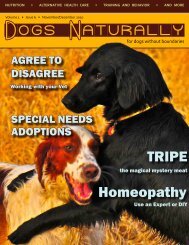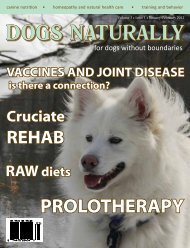July/August 2010 - Dogs Naturally Magazine
July/August 2010 - Dogs Naturally Magazine
July/August 2010 - Dogs Naturally Magazine
Create successful ePaper yourself
Turn your PDF publications into a flip-book with our unique Google optimized e-Paper software.
The shelter dog had clearly been neglected in his past. His coat<br />
was dull, and his eyes stared blankly into space as he barked<br />
continuously. The staff asked me to please try to help calm<br />
him, since he had been hysterically barking since he had arrived.<br />
I sat quietly outside his kennel, put in my earplugs and<br />
took a deep breath. I imagined the energy of the earth flowing<br />
up through my body, grounding and centering me, and mentally<br />
offered the dog some healing energy, if he chose to connect<br />
with me. I closed my eyes and inside my mind imagined<br />
myself in a quiet, beautiful place. Peace, safety and harmony: I<br />
held these three words in my heart. I imagined how the dog<br />
looked when he was calm and perfectly relaxed. I imagined I<br />
could embrace him with love from my heart. Sure enough, as<br />
I’ve seen in so many Reiki treatments, after a few moments<br />
the dog stopped barking and stared intently at me. A few more<br />
moments passed and he lay down in the kennel, took a deep<br />
breath and rested his head on his front paws. Silence had<br />
never felt so golden.<br />
Reiki, a system that creates relaxation and stress-relief, is a<br />
wonderful way to support the healing journey of rescued dogs<br />
and to support ourselves as we walk this path with them. The<br />
name Reiki, pronounced “ray-key,” comes from the Japanese<br />
words “rei” meaning spirit and “ki” meaning energy. It is usually<br />
translated as “universal life energy.” Reiki is about being<br />
able to hold a space of balance within ourselves—even in the<br />
midst of a chaotic or troublesome situation. If we can practice<br />
maintaining this kind of inner balance and calm in our own<br />
lives, we will see a ripple effect in all that we do. In working<br />
with rescued dogs, we can see them responding to our inner<br />
state of balance in a positive way, becoming calmer and more<br />
peaceful. We can also see our relationship with them going<br />
much deeper.<br />
The Five Precepts<br />
Reiki as a healing modality is a meditative art. It is simply<br />
about focusing one’s compassionate intention to support another<br />
being. When using Reiki to heal a dog, for example, the<br />
practitioner simply sets an intention to facilitate the healing<br />
process of the dog and then allows Reiki to flow in whatever<br />
amount the dog wishes to receive and for whatever he or she<br />
needs most.<br />
<br />
by: Kathleen Prasad<br />
Reiki is ideal for use with animals because effectiveness is not<br />
dependent upon physical contact. The animal controls the<br />
treatment, accepting Reiki in the ways that are most comfortable,<br />
either hands-on or from a distance, or a combination of<br />
the two. Easy for anyone to learn and use, Reiki can do no<br />
harm, even when used by the most novice practitioner. It always<br />
goes to the deepest source of the problem and always<br />
supports a path toward balance and harmony. Since we often<br />
don’t know a rescued animal’s past, with Reiki we can simply<br />
allow the energy to flow where it will, knowing that a healing<br />
shift toward balance will occur.<br />
The five Reiki precepts for balanced living, taught by the founder<br />
of the system, Mikao Usui, are as follows:<br />
Just for today …<br />
Do not anger.<br />
Do not worry.<br />
Be humble.<br />
Be honest in your work.<br />
Be compassionate to yourself and others.<br />
These precepts are not only the foundation for self-healing in<br />
the system of Reiki, but can also be used as guides when working<br />
with rescued animals.<br />
1. Just for today do not anger. Working with rescued dogs can<br />
be very difficult when we see the results of past abuse or neglect.<br />
We can begin to feel ourselves becoming very angry<br />
about how the dog was treated, what he had to go through<br />
and so on. This anger at the dog’s situation can spiral into anger<br />
about the world as a whole and anger toward humanity’s<br />
treatment of dogs in general. Pretty soon we can find ourselves<br />
encompassed in a bubble of anger. This anger will<br />
merely distract us from our primary goal, which is to help the<br />
dog. If we are angry, the dog will sense that and not want to<br />
connect with us. If we can focus instead on our desire to help<br />
the dog, our anger can be mitigated by our compassion.<br />
It can also help us to see the dog with our heart instead of our<br />
eyes. If we can see deeper into the very essence and spirit of<br />
the dog—see that shining star just waiting to brighten our<br />
life—it will be easier to work through any difficulties we face<br />
with patience and calm. When we approach our rescued dog<br />
www.dogsnaturallymagazine.com <strong>July</strong>/<strong>August</strong> <strong>2010</strong> | 37












